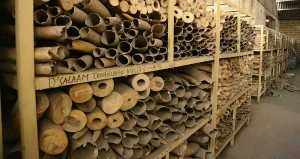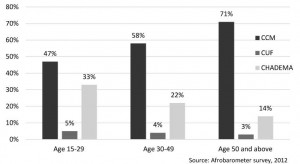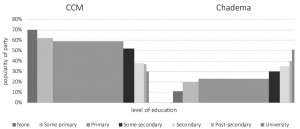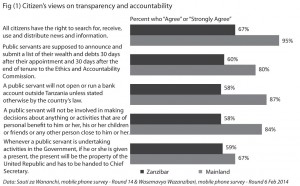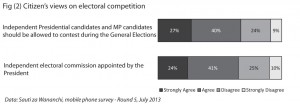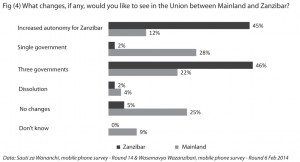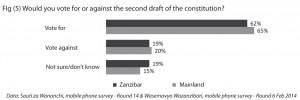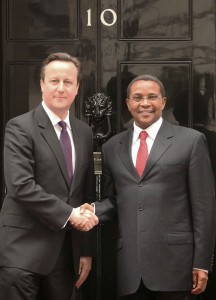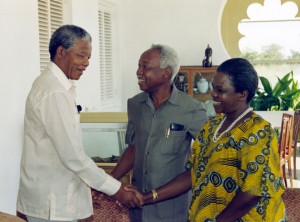by Mark Gillies
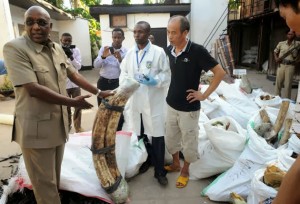
Prior to his resignation, Natural Resources and Tourism minister, Ambassador Khamis Kagasheki, inspects tusks impounded at a Mikocheni house (DSM)
Tokomeza – to scatter, or destroy, or to reduce to nothing.
In the autumn of 2013, a report commissioned by the government’s Wildlife Division and the Frankfurt Zoological Society concluded that the elephant population of the Selous Game Reserve had dropped to 13,000, its lowest recorded level. This is a drop of 80% from the previous survey in 2005, when there were an estimated 65-70,000 elephants. The cause of this decline was unrestrained, systematic poaching. At the current rate, in four years time there would no longer be any elephants left in the Selous.
The Tanzanian government had no choice: it had to act. The result was Operation Tokomeza, a cross-services, multi-ministry attempt to end the poaching of large mammals in Tanzania.
Initial success came in the form of increased seizures of illicit ivory, but this was soon overshadowed by horrific stories of beatings, sexual assault and even murder, some of which were recorded on mobile phones and posted on YouTube. MPs raised questions in Parliament, issuing a report that confirmed the existence of human rights abuses. The Minister for Natural Resources and Tourism, Hamisi Kagasheki, resigned, and three Ministers were sacked: the Minister for Home Affairs, Emmanuel Nchimbi, the Minister for Defence and National Service, Shamsi Vuai Nahodha and the Minister for Livestock Development, David Mathayo.
In the last days of 2013, President Kikwete cancelled Operation Tokomeza. In the months that have followed, as ivory seizures continue and a number of Chinese nationals have been arrested (one successfully prosecuted and sentenced to 20 years imprisonment), the international media, led by the Daily Mail and ITV in the UK, has caught up with the story of Tanzania’s poaching crisis, ratcheting up the pressure on the government and focusing on what is being done to protect the wildlife that Mwalimu Nyerere vowed to protect.
There is currently a struggle going on in rural Tanzania, where competing interests battle one another as well as the forces of the state that remain true to protecting the natural resources of Tanzania. To this battle must be added widespread ineptitude and inability to control men with guns but no sense of personal responsibility. A sense of fear pervades all those willing to contribute information for this article; not one would agree to be identified. They fear the consequences of becoming known to those with power, those with weapons, or both.
According to one source, close to, but not involved in, the operation in the vicinity of the Selous, Tokomeza was inspired by Operation Uhai, the 1989 ‘silver bullet’ that was seen to have successfully stopped poaching at the end of the 20th Century. Tokomeza was intended to repeat this, or at least provide a positive PR opportunity.
While some involved in the operation were motivated by media coverage and not the actual result, committed individuals across the services, led by the Minister, Khamis Kagasheki, made comprehensive preparations.
In the northern Selous, three lorry loads of soldiers from Tanga, three Land rovers of police field force from Morogoro, two TANAPA Land cruisers with rangers from Ruaha/Mikumi, and locally based Wildlife Division rangers arrived at night, and the next day were out in the villages. A similar pattern was also witnessed in the Ruaha National Park area and across Northern Tanzania.
Results came quickly, for the first time in over a decade more illegal ivory was seized in Tanzania than in transit to (or in) the Far East. In 2013, there were 56 seizures of ivory in Tanzania totalling 8,255kg, the equivalent of what has been seized over the last decade, and 216 suspected poachers and traffickers have been brought to court. Mobile phones confiscated from poachers provided the security services with invaluable information that enabled them to quickly move up the poaching command structure from the villages to those commissioning the killings.
In the opinion of the Selous source, two weeks into the operation the intelligence services had enough information to arrest a number of senior individuals, if there was the political will to do so. This information was compiled in a dossier that included the names of the senior people involved in the illegal trade, some alleged to be very close to the President.
The sources contributing to this article do not deny that human rights abuses occurred. Trucks full of detainees were seen and footage posted online purportedly showing soldiers and rangers beating villagers and engaging in brutal and degrading treatment. (https://www.youtube.com/watch?v=kwGnkTqVDhI). However, why was it at the exact point at which the dossier was compiled that MPs in parliament began protesting against the abuses of the operation, so that Tokomeza was suspended? Policing actions across Africa are often brutal, but in this case, the allegation is that the brutality itself was a means by which to sabotage the operation and bring it to a premature end. Fear of collusion between game rangers and poachers was such that operational personnel were trucked in from distant districts, but perhaps the effect of corruption in the upper echelons was underestimated? (http://www.rasilimaliwatch. org/index.php/en/component/content/article/19-sample-dataarticles/main/24rasilimali)
To understand the story of poaching in Tanzania, it is necessary to understand the stakes. The website ‘Serengeti Watch’, illustrates the financial reality of the poaching war well:
‘During this time (2009-13) – Poachers could make $300 a tusk, grossing more than $34 million. Middlemen sold to sellers in the city for about $1000 a tusk, total profit $23 million. Sellers passed onto exporters for $1400 a tusk, total profit $23 million. In China one pound of ivory sells for about $1000, making the gross value of Selous’ elephants worth billions. This big money has attracted organized crime, corrupt officials, and terrorist groups like Al-Shabab.’
(http://www.savetheserengeti.org/uncategorized/selous-game-reserve-tragedy/)
Yet, this is not just a story of personal aggrandizement. 2015 will be an election year in Tanzania. The ruling party is divided; new political parties threaten change; and elections campaigns cost large amounts of money. It is a sad joke that when safari drivers pass one another on a game drive and pause to ask the whereabouts of the animals that all tourists wish to see, they no longer use ‘masikio’ (ears) for the elephant, but the name of a senior ruling party official.
Operation Tokomeza is a story of the appropriation of national resources for private profit. It is a story of ineptitude and unrestrained violence, but it is also an example of what can be achieved by the men and women of Tanzania committed to protecting the animals that continue to contribute so much to the development of the nation, even in these days of gas, gold and uranium.
When Minister Kagasheki addressed the House prior to his resignation, he spoke of the need for an investigation into what really happened during Tokomeza. It is suspected he knows well enough, but he needs someone else to do the telling.
There are calls in Tanzania for a second Tokomeza. Sadly, this is a story that will continue just as long as you can buy ivory in Mwenge Market. As of now, you can.
Editor’s note:
In February President Kikwete attended the London Conference on the Illegal Wildlife Trade, and together with the leaders of Botswana, Gabon and Chad promised that he will not ask for permission from CITES to sell any of the Tanzanian ivory stockpile (currently 137 tons of ivory, worth over US$80 million). He further noted that the government was organizing financial and logistical requirements to re-launch Operation Tokomeza.
